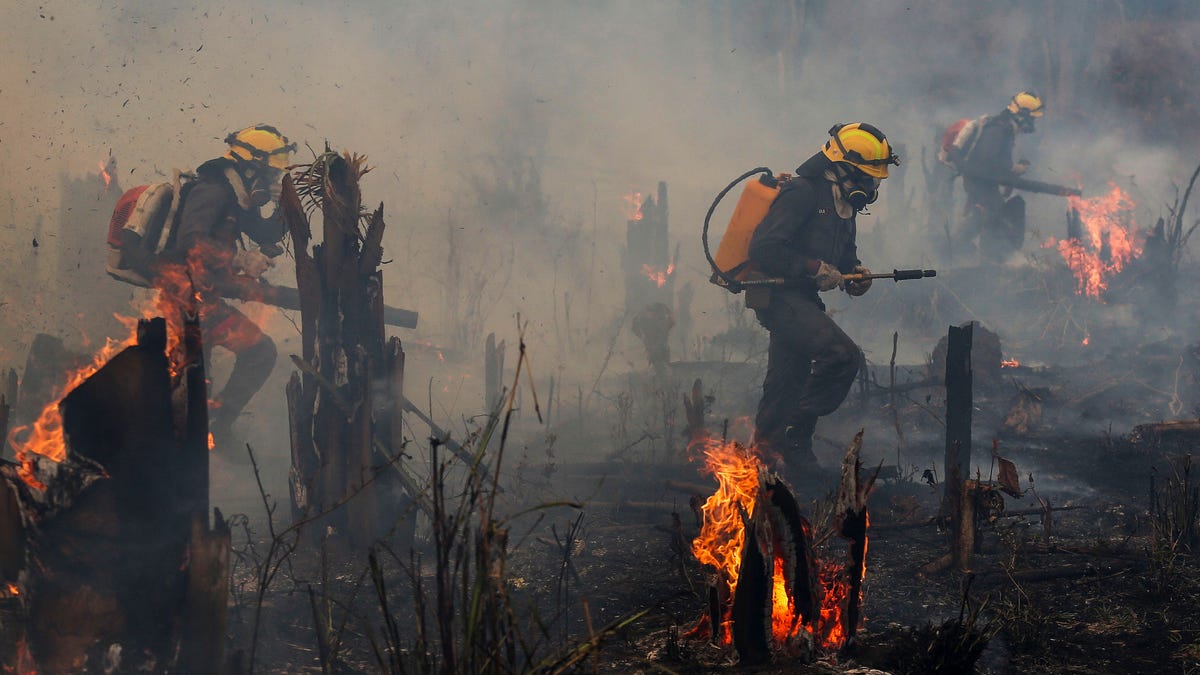The World Will Overshoot the 1.5 Degree Global Warming Limit. Now What?
Increasing the ambition of climate pledges by 2030 is key to limiting global warming.

Firefighters in the Amazon rainforest in September 2022.
As the United Nations COP27 climate conference kicked off this week in Egypt, UN Secretary-General António Guterres proclaimed that the world is on a "highway to climate hell with our foot still on the accelerator." To keep temperature from rising 1.5 degrees Celsius above preindustrial levels by 2100, we need to pump the brakes on greenhouse gas emissions. Hard.
In fact, we'd basically have to bring the runaway truck to a complete and immediate halt.
The climate pledges made by nations at last year's COP26 conference felt like a positive step in the right direction, but there's very little doubt that the average temperature rise on Earth will exceed the 1.5 degree mark in the coming decades -- an "overshoot" scenario -- before potentially coming back down by the end of the century. Can we limit this overshoot? And how might we do that?
A study, released Thursday in the scientific journal Nature Climate Change, tried to answer those questions by modeling 27 different emissions reduction pathways of varying ambition. It came to an unsurprising conclusion: Countries need to act by increasing the ambition of their climate pledges. And they need to act now.
"If countries can ratchet their 2030 ambition during the COP this year, then that could significantly reduce both the duration and the magnitude of overshoot," said Gokul Iyer, a scientist at the Joint Global Change Research Institute and first author of the study.
The 1.5 degree rise has long been seen as a critical mark in the fight against climate change. Since the signing of the Paris Agreement at COP21 seven years ago, scientists have rigorously studied how this level of warming above preindustrial temperatures would affect the Earth. The models and simulations they've built show we are likely to see more extreme weather events, in addition to glacial melt, sea level rise that threatens many low-lying Pacific nations and significant loss of biodiversity once temperatures push past an increase of 1.5 degrees.
At COP26, in November 2021, countries outlined more ambitious emissions reduction pledges (known as NDCs) in an attempt to curb global warming. However, research by Iyer, Haewon McJeon and colleagues last year showed that even if these pledges are met, it's likely temperatures will rise about 1.8 degrees Celsius by the end of the century.
As part of the Glasgow Climate Pact, signed at COP26, nations were to come up with evermore ambitious pledges to decarbonize. The new study drops at a critical time, when those discussions are being had in the giant conference halls in Egypt for COP27.
McJeon, a researcher at the Joint Global Change Research Institute and co-author of the study, hopes the study helps highlight the "gap" between the current pledges and the major target of 1.5 degrees. It examines how countries can increase the ambition of pledges via three particular mechanisms: increasing near-term actions up to 2030, accelerating decarbonization after 2030 and bringing forward net-zero pledges.
"The single most important thing that we find on the menu of options to ratchet the ambition is ratcheting up the ambition for 2030," McJeon said.
Without scaling up ambitions in the near term, we're looking at an overshoot period that could last for decades and carry on well through 2100. However, if countries double down on their pledges, as laid out in the Glasgow Climate Pact last year, then there's an opportunity to reduce the overshoot time to around half a century. That could make a big impact on the health of humans and the environment.
"Every tenth of a degree counts. Every year of overshoot counts," McJeon said.
McJeon noted there has been incremental progress over the past five years -- it's not satisfactory or enough to limit warming to 1.5 degrees -- but it's further ahead than where it seemed to be heading about five years ago.
While overshooting 1.5 is bad (and it is bad), 2 degrees of warming is even worse. On Thursday, the annual Carbon Budget Report revealed we might exceed the latter mark in just 30 years if we carry on with a business-as-usual approach. A 1.5 degree increase would be locked in by the end of the decade.
Though the 1.5 degree target is practically dead, the situation isn't hopeless. Now more than ever, there's reason to reduce greenhouse gas emissions by setting more ambitious goals. But, Iyer notes, ambition alone is not enough. We also need action -- investing in renewables and technologies like carbon capture and rapidly transforming our energy systems and infrastructure.
As dignitaries and policymakers meet in Egypt, McJeon has a pretty simple message.
"I hope they read our paper," he said.
Updated Nov. 11: Added details on Carbon Budget.

